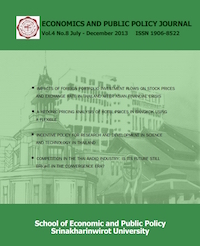Impacts of Foreign Portfolio Investment Flows on Stock Prices and Exchange Rate in Thailand after Asian Financial Crisis
Main Article Content
บทคัดย่อ
The purpose of this study is to investigate the impacts of foreign portfolio investment on stock prices and exchange rate in Thailand after the Asian financial crisis. The monthly data used in this study are the net foreign portfolio investment and exchange rate of baht per US dollar issued by the Bank of Thailand. SET index data are from the Stock Exchange of Thailand. The period covers January 1997 to December 2012. The methods employed to investigate the relationship and impacts of foreign portfolio investment include: least square, correlation coefficient, VAR models, cointegration and error correction mechanism, impulse response analysis and variance decomposition. The results of the present study show that the stock prices had a long-run positive relationship with the net foreign portfolio investment, while the exchange rate had a long-run negative relationship with the net foreign portfolio investment. In addition, the high market return was a factor that influenced foreign equity securities investment in the stock market. The low volatility index was a factor influencing foreign equity securities investment in the stock market, while the high interest rate difference, low volatility index and high business sentiment index were factors that influenced foreign debt securities investment in the bond market. Due to the impacts of foreign portfolio investment, the Bank of Thailand introduced measures such as cut policy rate and reserve requirement on short-term capital inflows together with other alternative policies, for example, the method of switching from inflation targeting to exchange rate targeting, establishing emergency foreign exchange management mechanism, enforcing a capital control (limiting foreign investors from removing money within three months from entry date) and improving the Bank of Thailand’s sterilization mechanism. This study revealed the evolution of changes from the financial crisis of January 1997 up to December 2012, showing a dramatic increase in debt securities investment. Therefore, the Bank of Thailand may take consider implementing an alternative measure such as the taxation of three-month bonds to six-month bonds to reduce short-term capital inflow.
Article Details
ประเภทบทความ
บทความวิจัย
สงวนลิขสิทธิ์ © 2553 คณะเศรษฐศาสตร์ มหาวิทยาลัยศรีนครินทรวิโรฒ
คณะเศรษฐศาสตร์ มหาวิทยาลัยศรีนครินทรวิโรฒ จัดพิมพ์วารสารเศรษฐศาสตร์และนโยบายสาธารณะ เพื่อเผยแพร่บทความวิชาการทางเศรษฐศาสตร์ นโยบายสารธารณะ และสาขาอื่นๆที่เกี่ยวข้อง ทัศนะและข้อคิดเห็นใดๆ ที่ปรากฏในวารสารเป็นความคิดเห็นส่วนตัวของผู้เขียน โดยบทความที่ได้รับการตอบรับจะถือเป็นลิขสิทธิ์ของคณะเศรษฐศาสตร์ มหาวิทยาลัยศรีนครินทรวิโรฒ
บรรณาธิการ อาจารย์ ดร.พลพัธน์ โคตรจรัส


